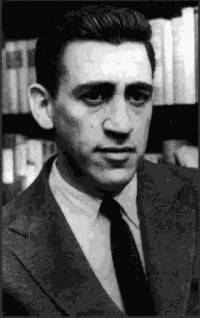 In the fall of 2001, I was in seventh grade, and assigned to the homeroom instruction of a man we christened “the ‘Shaw.'” With long wavy salt-and-pepper hair (leaning more toward the salt side), glasses, and a penchant for indoctrinating his students in the unseemly hobbies of rock and coin-collecting, this teacher supervised silent sustained reading in homeroom a few times per week. Upon seeing that little starch-white-skinned, scraggly-red-haired me carried about a copy of the notorious adolescent classic The Catcher in the Rye, the ‘Shaw scrutinized the scene behind those wire-rimmed glasses, held his gray chin and decided the best way to proceed.
In the fall of 2001, I was in seventh grade, and assigned to the homeroom instruction of a man we christened “the ‘Shaw.'” With long wavy salt-and-pepper hair (leaning more toward the salt side), glasses, and a penchant for indoctrinating his students in the unseemly hobbies of rock and coin-collecting, this teacher supervised silent sustained reading in homeroom a few times per week. Upon seeing that little starch-white-skinned, scraggly-red-haired me carried about a copy of the notorious adolescent classic The Catcher in the Rye, the ‘Shaw scrutinized the scene behind those wire-rimmed glasses, held his gray chin and decided the best way to proceed.
“Do your parents know you’re reading that book, Mr. DeMarco?”
He had no idea that I came from a fairly literary household where books were free reign. In fact, I found the profanity in Catcher quaint and hardly worth imitating. Chrissake? Who says chrissake? But, prince was cool. I still call people princes. I have yet to get “flicked” by a New York City pimp, though.
“Yeah, they’re cool with it.”
Alright then.
*
On September 11th, 2001, I was in seventh grade, and assigned to the ‘Shaw’s homeroom where he played videos on medieval history some days – Wednesdays I think – and sold us popcorn. Rather, he allowed us to donate money to a somewhat-specified fund and delivered popcorn as a thank-you, as long as we weren’t the hooligans continually tossing it back and forth at each other, rubbing grease on the desks stomping kernels into the linoleum floor. We all were those hooligans. The donations were to be ear-marked for a school 9/11 memorial, a public thing like a tree or a park bench.
Then one day, the ‘Shaw decided a better, more realistic use of the funds we had already lined his coffers with would be the purchase of more medieval history tapes or DVDs with little stickers commemorating 9/11 from the class of 2003.
We did not like this. We did not like his tapes. We thought they would be a poor memorial.
 It would be a year before we had a hip new teacher, fresh out of that Big Ten school situated in a metropolis 150 or so miles south of our suburban Chicago world, bent on getting his kids to re-examine history and, as part and parcel of this approach, intermittently assigning Xeroxed excerpts from Howard Zinn’s landmark work A People’s History of the United States. We were ripe for it. We were fresh from our petitions and meetings with the ‘Shaw and ready to learn how to organize. And start our own pathetically self-indulgent ‘zine — to fight the school authorities so they’d allow us to distribute the free rag. When the fight was won, we made it to a second issue. Somehow the third never came…
It would be a year before we had a hip new teacher, fresh out of that Big Ten school situated in a metropolis 150 or so miles south of our suburban Chicago world, bent on getting his kids to re-examine history and, as part and parcel of this approach, intermittently assigning Xeroxed excerpts from Howard Zinn’s landmark work A People’s History of the United States. We were ripe for it. We were fresh from our petitions and meetings with the ‘Shaw and ready to learn how to organize. And start our own pathetically self-indulgent ‘zine — to fight the school authorities so they’d allow us to distribute the free rag. When the fight was won, we made it to a second issue. Somehow the third never came…
Funny how passion only seems to carry you so far at thirteen. After all, you’ve got to worry about whose mom is giving you a ride to the mall on Friday.
*
In the fall of 2001 and spring of 2002, I read the rest of J.D. Salinger’s collected works, notwithstanding obscure relics like “Hapworth 16, 1924.” In the fall of 2002 and spring of 2003, I began to read Howard Zinn. I will confess, I never read the entire People’s History, but the excerpts made the leap to Noam Chomsky and Naomi Klein, Eric Schlosser and John Perkins a lot easier. At the end of my junior high education, I had a framework, and I owe a lot of it to Howard Zinn and J.D. Salinger. Now, less than ten years later, they’re gone. Nearly the same age on the same day.
I try to find some sort of omen here, but it’s incredibly difficult. One man spent decades of his life publishing, organizing, and resisting. One man spent decades of his life in a shack in New Hampshire writing things nobody would ever see. Now they’ve both fallen down. One man is easy to miss. One man you missed before you knew him. One man, you can picture an epitaph reading, “Don’t mourn, organize.” On the other you can imagine, “Damn phonies.”
What I find amazing is that, at the end of both of these authors’ lives, the aura of death implicit in a celebrity’s passing was more of a candle’s flicker than a luminescent glow; in both cases, for the public, the work and its fruits were larger than the man behind them. There will be no ceaseless speculation about the final days, the quiet desperation, or the eternal silence to follow. There is the fact of death and little else. There are the revolutionary books and the bygone author.
In many ways, Salinger seems to be the Seymour Glass of his own career for our retrospective lens. He was gone before we even got to him, hiding outside media scrutiny, refusing to progress in front of us; the figure that moved in the corner of our eyes as the action dashed across the page from line to line. He was the figure that shaped and motivated the work and disappeared before we could chart where he went.
Zinn was one of his characters as well. Actually, he was probably any character he ever cared about — an organizer and fighter on the side of marginalized perspectives and actors. He was a public man, appearing on Bob McChesney’s local public radio program Media Matters several times in the last few years.
What is at work here is two different perceptions of speech. Both men lived speech and both men died speaking. Zinn was a man who saw his speech as a challenge to the status quo and so continued to yelp until the end. Salinger was a man who saw his speech as an alienating force if heard too loudly, something to distance himself from before it over-ran his person, his emotional status quo.
As these men exit the Great American Novel, we enter a decade where their conflicting attitudes are ever more dramatic. The activist edge and citizen journalism are being radically democratized by blog-hosting sites and Youtube, empowering the citizens to organize locally and spread globally. We also run the risk of our democratic frontier being overrun by the phonies of Astroturf political organization. Simultaneously, media consolidation in traditional forms nears a fever-pitch and people are turning away from literature. So what we face moving on is not so much a crisis as a re-imagining of speech. Will we allow our words to alienate ourselves, get us mistaken for the corporatists and phonies, or we will engage in the dynamic space of a free economy of ideas and freer creativity?
In the dedication to Raise High the Roof Beam, Carpenters and Seymour: An Introduction, Salinger mused if there were any amateur readers left and asked them to “split the dedication of this book four ways with my wife and children.”
We still have plenty of amateur readers here in CU, and, now, many of us split our perpetual gratitude with you and Zinn. See you later, men.








